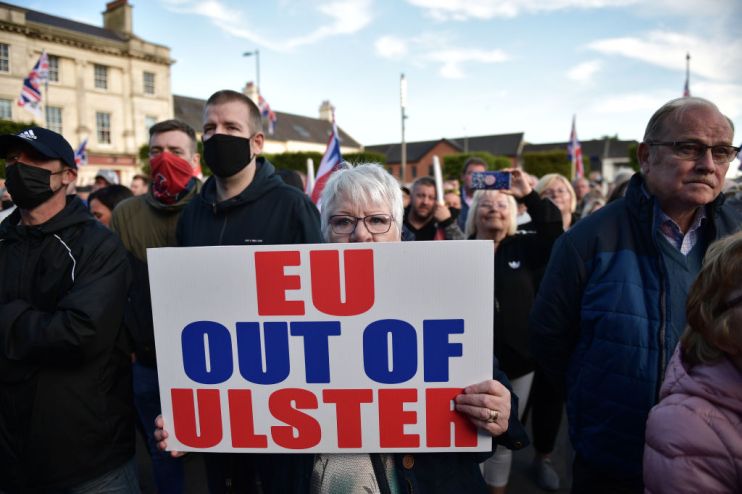What are the UK-EU ‘sausage wars’ in Northern Ireland and are they over?

Yesterday’s confirmation that Brussels and London have agreed a truce to the so-called sausage wars has, at least momentarily, eased UK-EU tensions about the implementation of the Northern Ireland Protocol.
The EU agreed to delay the ban on Great British sausages being sent to Northern Ireland until the end of September, after threats from Boris Johnson to unilaterally suspend the protocol during the row.
It came after months of tense UK-EU negotiations and a series of public threats from either side.
But, what is the sausage ban about and does this mark an end to problems related to the Northern Ireland Protocol?
What is the Northern Ireland Protocol?
The Northern Ireland Protocol is a part of the Brexit Withdrawal Agreement and sees Northern Ireland follow the EU’s customs union and single market rules, unlike the rest of the UK.
This was done to ensure there is not a hard border on the island of Ireland, which would have violated the principles of the Good Friday Peace Agreement.
It also means there is a so-called border in the Irish Sea, with some checks on goods required between Great Britain and Northern Ireland, which has infuriated some parts of the unionist community.
Brussels has insisted on applying rigorous checks on goods from Great Britain at the border where possible to ensure unauthorised products do not enter its single market through the backdoor.
Chilled meats ban
Chilled meats, such as minced beef and sausages, made in Great Britain were due to be banned in Northern Ireland at the end of June under the protocol.
Brussels does not allow chilled meats from non-EU countries to enter its single market due to concerns over sanitary conditions.
The ban was set to come into place six months after the end of the Brexit transition period ended in order to give Northern Ireland businesses a “grace period” to prepare for the new regulations.
The grace period will now last until the end of September.
Talk turned toward the UK unilaterally ignoring the ban last month, with Johnson and his aides saying repeatedly that “all options are on the table”.
European Commission vice president Maros Sefcovic said in a fiery press conference that this action could lead to a trade war.
Sefcovic said yesterday, when confirming the grace period extension, that there needed to be a long-term solution.
“A continuous rolling over [of grace periods] does not give predictability to businesses in Northern Ireland,” he said.
Sefcovic has called for a Swiss-style agreement, which would see the UK copy EU regulations on plant and veterinary products – something he says would eliminate 80 per cent of checks in Northern Ireland.
Johnson and his de-facto Brexit minister Lord David Frost has refused this proposal as it would make the UK a rule taker.
How about other goods?
There was a separate grace period on checks for other supermarket goods, parcels and medicines that was supposed to expire at the end of March.
The end of the grace period would have meant customs declarations forms and border checks for exporters sending these goods from Great Britain to Northern Ireland.
This was unilaterally extended until October by the UK, which sparked fury from Brussels.
The EU accused the UK of breaking the Withdrawal Agreement, and thus international law, and launched legal action.
Sefcovic is reportedly in favour of permanently scrapping checks on medicines to ensure that there are not delays for vital supplies coming into Northern Ireland, while EU leaders do not want any changes.
Johnson and Frost have argued that the EU’s bureaucratic approach to border checks will mean supply shortages, economic damage and unionist unrest in Northern Ireland.
Brussels says it is applying the protocol to the letter of the law.
French President Emmanuel Macron said last month that “nothing is negotiable” and “everything is applicable” when it comes to the protocol.
These comments came on the eve of the G7 summit in Cornwall, where Johnson traded barbs with EU leaders over Northern Ireland.
Macron told Johnson that Northern Ireland was not really a part of the UK in one meeting, sparking fury in Number 10 and across Whitehall.
What happens now?
The UK and EU will have to find a long-term solution to issues on how to administer the protocol to avoid more cliff edges later this year.
Lord David Frost has often talked about there being real world deadlines for solving the issue as tensions continue to rise among some Northern Ireland unionists.
The protocol was partly blamed on days of violent rioting in Belfast earlier this year, while two Democratic Unionist Party (DUP) leaders have been ousted in the past six weeks over the post-Brexit arrangement.
Judging from previous rows, it is likely that this one will roll on for some time and be used by either side as a stick to beat the other when politically convenient.